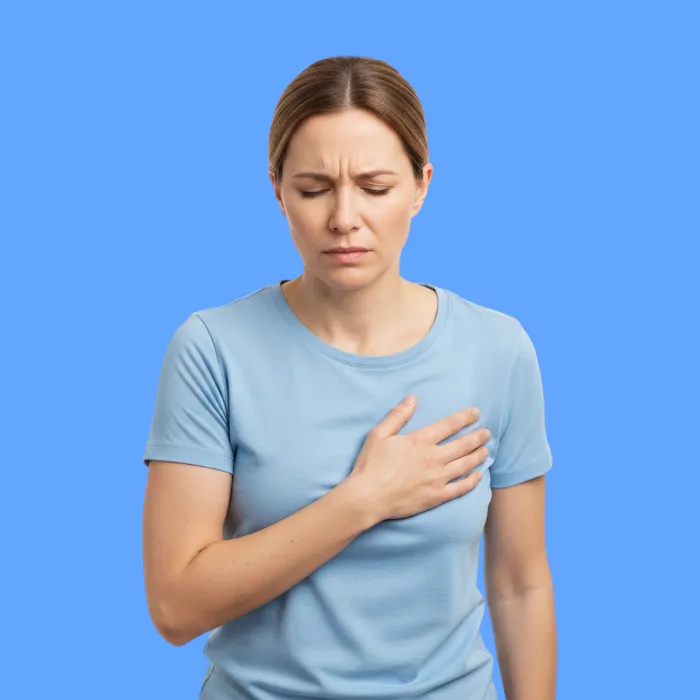what is high cholesterol?
High cholesterol is a condition that occurs when the level of bad cholesterol in the blood exceeds normal limits, increasing the risk of heart and vascular diseases.
Cholesterol is a fatty substance naturally produced by the body and also found in some foods.But when this substance accumulates in the blood vessels, health problems begin to appear gradually.
what are the causes of high cholesterol?
There are several reasons that lead to high cholesterol in the blood, including:
- Eating foods rich in saturated fats such as processed meats and fried items.
- Lack of physical activity and not exercising regularly.
- Obesity and significant weight gain.
- Smoking affects fat balance in the body.
- Genetic factors play a major role in some cases.
- Having chronic diseases such as diabetes or hypothyroidism.
- Aging increases the likelihood of developing the condition.
- Constant stress and psychological pressure affect overall health.
what are the common symptoms of high cholesterol?

Symptoms may not be obvious at first, but there are signs that can be noticed, including:
- Chest pain or pressure, especially during exertion.
- Shortness of breath or unexplained fatigue.
- Yellow fatty deposits around the eyes or under the skin (xanthomas).
- Dizziness or frequent headaches without a clear cause.
- Poor concentration or feeling confused.
- Cold extremities or changes in their color.
- Sudden high blood pressure.
- Circulatory problems such as numbness in the legs.
when should you see a doctor?
It is recommended to consult a doctor if any signs appear or risk factors exist, including:
- Family history of heart disease or cholesterol issues.
- Frequent chest pain or shortness of breath.
- Appearance of abnormal fatty lumps on the skin.
- High blood pressure or diabetes.
- Rapid and unexplained weight gain.
- Blood test results indicate high cholesterol.
- Persistent fatigue without a clear reason.
- Desire to undergo a routine checkup for reassurance.
what are the treatment methods for high cholesterol?
Treatment depends on lifestyle changes first, then medication if needed, including:
- Following a healthy diet low in saturated fats.
- Exercising regularly such as walking or swimming.
- Quitting smoking completely.
- Gradually reducing excess weight.
- Taking cholesterol-lowering medications like statins.
- Monitoring cholesterol levels regularly.
- Reducing stress and psychological pressure.
- Avoiding processed and fried foods.
can high cholesterol be cured?
Yes, high cholesterol can be effectively controlled if treatment and lifestyle changes are followed.
Full recovery depends on the patient's commitment to medical advice and the influence of genetic and other health factors.
what are the prevention tips for high cholesterol?
Prevention starts with healthy daily habits, including:
- Eating fresh vegetables and fruits daily.
- Using healthy oils like olive oil instead of hydrogenated oils.
- Reducing consumption of red meat and fast food.
- Exercising for at least 30 minutes daily.
- Drinking adequate amounts of water.
- Avoiding smoking and alcohol.
- Performing regular cholesterol tests.
- Maintaining a healthy and stable weight.
what are the possible complications of high cholesterol?
If left untreated, it may lead to serious complications, including:
- Arteriosclerosis and vessel blockage.
- Heart attacks.
- Strokes.
- Chronic high blood pressure.
- Poor circulation in the limbs.
- Kidney problems due to poor blood flow.
- Memory loss or concentration issues.
- Sudden death in severe cases.
frequently asked questions about high cholesterol
Does high cholesterol cause heart pain?Yes, it may lead to chest pain due to blocked arteries.
Can cholesterol rise without symptoms?Yes, and symptoms often appear only in advanced stages.
Can cholesterol be treated without medication?In some cases, it can be controlled through lifestyle changes alone.
Does cholesterol affect the brain?Yes, it may cause concentration problems or increase stroke risk.
article summary
High cholesterol is a silent disease that may go unnoticed but carries serious risks for the heart and brain.
Prevention starts with a healthy lifestyle, and treatment requires real commitment to medical instructions.Regular checkups and healthy nutrition are the first line of defense against this disease.